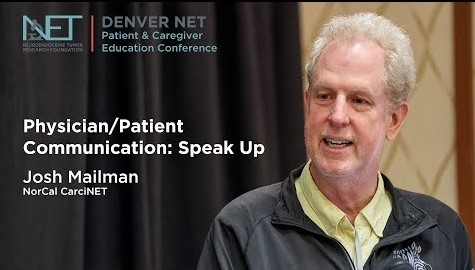Talking to Your Doctor About NETs
Home » For Patients » Newly Diagnosed » Talking to Your Doctor About NETs

Talking to your doctor about NETs (neuroendocrine tumors) can be tough. You want to be cooperative and respectful of your cancer care team, but at the same time, you want to see your concerns addressed.
How to improve communication with your cancer care team
Doctor appointments can sometimes be overwhelming. There may be a lot of information shared, that you don’t have time to digest or even understand. And it may seem like there is never enough time to ask all your questions. To make the most of your appointments, consider some of the following suggestions.
Preparing for doctors’ appointments
Preparation helps when it comes to talking to your doctor about NETs.
- Write down your questions in order of importance. Don’t leave out something you think will be considered silly. List all your questions.
- Keep track any symptoms or side effects you’re experiencing. Include details about how long you experience problems, how severe your symptoms are, and whether they interfere with your ability to carry on with daily activities.
- When seeing a new provider or specialist, bring a copy of your current medications and ask what other medical records you need to bring.
- Try to figure out transportation, directions, and parking in advance to make your arrival go as smoothly as possible. For large institutions, find out what entrance and elevator you need to take to get to the right floor.
- If possible, consolidate multiple appointments on the same day.
- Ask about using imaging centers or laboratories close to your home for any routine testing.
- Ask someone to come with you to help ask questions and take notes.
- Start a notebook, file, or another central place to keep all your information.
- Let your doctor know in advance if you need an interpreter due to language differences.
Making the most of your appointments
Is there so much going on in each office visit that there seems no time left for talking to your doctor about NETs issues, challenges, and concerns? A few fundamental tips can help you make sure all your needs are addressed.
- Let your care team know you have questions about NETs that you plan to ask your doctor.
- Ask your most important questions first in case you run out of time.
- Summarize your doctor’s answers so he or she can confirm your understanding.
- Ask your doctor to repeat or explain anything you don’t understand.
- Ask permission to record the conversation with your cell phone so you have something to refer to later on when you have questions.
- Ask for written information. If you want to learn more about a topic or need the correct spelling of treatment, or your diagnosis, ask your doctor to write it down for you.
- Express concerns you have about accessing treatment, such as costs or transportation.
- Find out about resources, financial, transportation, or medication assistance programs and support groups.
- Ask who you should call if you have any questions or experience any changes in your health. Get names, phone numbers, and emails for routine office hours and for after-hours emergencies.
- Find out who will be communicating with your health insurance plan to obtain approval for any planned tests or treatments.
It is important to establish and maintain good communication with your care team as it builds trust. By being more informed and involved in your care, you may find it easier to follow your care plan to work towards the best possible results.
Make sure you’re with the right person
Pay attention to how you feel when you are meeting with your doctor. If you have doubts and aren’t sure he or she is right for you, you may want to consider changing doctors. When you are with the right doctor, you should feel a trusting connection. We offer a searchable database of NET specialists to help you locate doctors and treatment centers.
The Los Angeles, California patient support group called LACNETs offers an online tool to help patients prepare for and manage conversations with providers called NET VITALS. NET VITALS provides a working document for the patient to understand key vocabulary about their disease and a way to keep track of their status.
Navigating the NET Patient Journey
The Healing NET Foundation has a new resource for patients and caregivers that offers valuable insights and resources for living with neuroendocrine cancer. Navigating the NET Patient Journey was written by a team of support group leaders, patients and caregivers and offers lesson and advice from those who have lived it as well as the expertise of leading NET specialists.

Coping with the Uncertainty of Cancer
Coping with the uncertainty of a cancer diagnosis means finding ways to take your mind off cancer, to do what you enjoy most, finding meaning and purpose.

Trust Challenges in the NET Patient/Doctor Relationship
After you’ve been told you had food poisoning or were in menopause, but you had cancer….how do you learn to trust your doctor again? NET specialist Pamela Kunz, MD, talks about trust issues between doctors and patietnts.

The Power of Self-Advocacy
This young PNET patient knew something was wrong, but his doctor didn’t believe him. Since this PNET patient was also an oncologist, he asserted the need for further testing to clarify the diagnosis. In a guest blog Mark Lewis, MD, shares insights on listening to your body and getting doctors to listen to you.
Staying up-to-date on COVID-19
The COVID-19 outbreak is rapidly changing. Aspects of the content may have changed since it was published. To stay abreast of the situation, follow these trusted resources for the latest information:

How to talk to your doctor about NET sensitive issues.

See why NET patients and physicians say it is important to find a NET specialist
